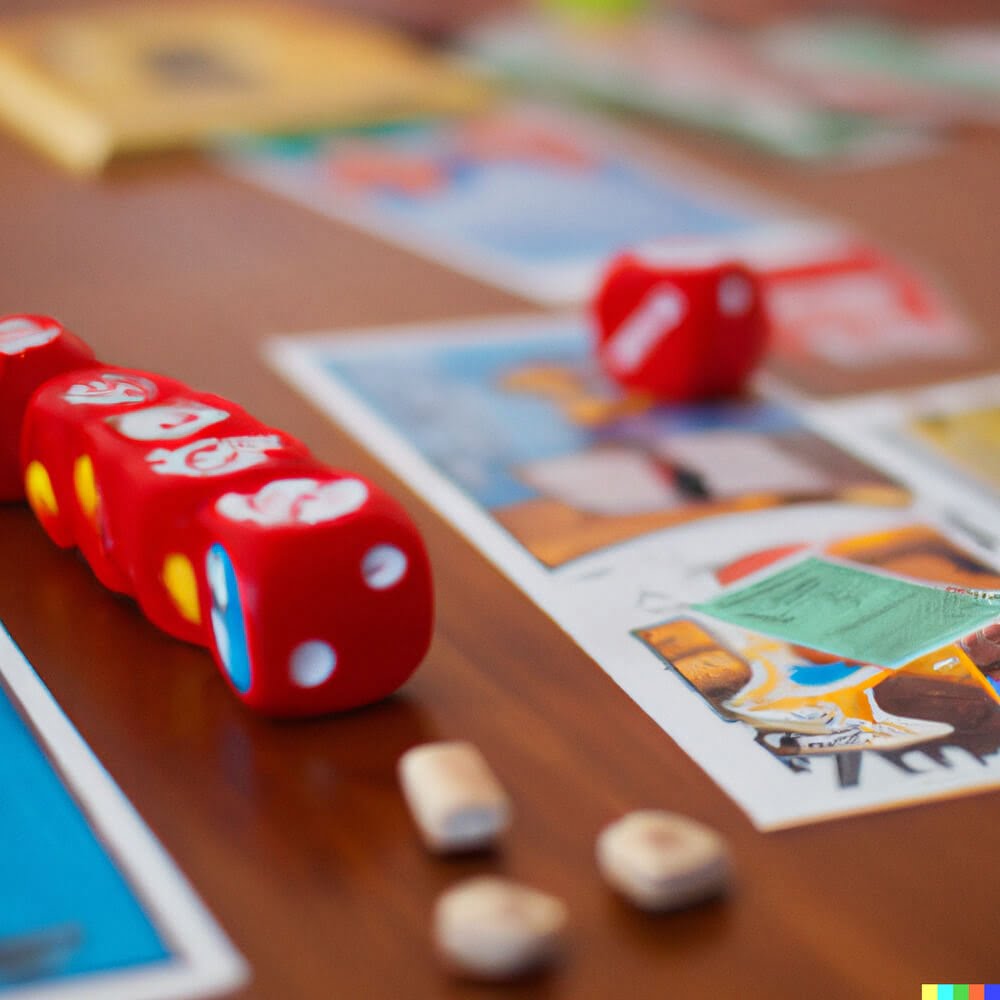Introduction
Board games are currently experiencing a resurgence in popularity, with many people of all ages turning to them for entertainment. This phenomena has become particularly visible in the past few years, as traditional board and tabletop games have experienced a surge in usage. Reasons for this can be found in the interactive nature of these games, where players share experiences while playing together. In this paper, these reasons will be explored further, and the impact that board games are having on contemporary culture will be discussed.
The most obvious reason for this trend is the enhanced interactivity that board games offer compared to other forms of media entertainment. With their focus on strategy, collaboration and competition, board games enable family and friends to engage directly with each other without having to compete against people online or via social media. The analog setup also encourages users to combine both physical activities and mental stimulation within a single game session, allowing them to collaborate simultaneously on multiple facets of the gaming experience.
Furthermore, the sheer variety of types of board game available today gives users an unprecedented level of choice when it comes to what they play and experience among competing players. From classic favorites such as Monopoly and Clue to newer options like Catan and Exploding Kittens; different age groups can find something suitable no matter their interest or skill level. Board game creators have embraced this freedom by creating titles across many genres including war-strategy titles like Risk; word deduction challenges such as Scrabble; puzzle-based participants like Jenga; role-playing adventures such as Dungeons & Dragons; card tournaments like Magic: The Gathering; educational titles including Osmosis or Timeline; creative contests such as Pictionary or Charades; cooperative gameplay options such as Pandemic or Forbidden Island; or any number of fantasy-driven realms for participants to explore – the options truly seems endless!
Finally, it is worth noting that all these factors have come together at an opportune time – with more people than ever before finding themselves looking for alternative ways to spend their leisure time due to current circumstances.. Not only does playing board games provide a learning curve throughout which players can improve over time but they can also immerse themselves in a different reality while staying safe during periods of stay at home orders.
In conclusion then, there are numerous reasons why board games are once again becoming popular amongst individuals who want stimulating gaming experiences which involve genuine interaction amongst peers rather than just digital pleasures through screens. It is clear – based on these facts – that modern culture has once again embraced what generations before have always enjoyed – but doing so from the comfort (and safety) of today’s living rooms!
Exploring the History and Evolution of Board Games
Board games have always been a major part of human culture, with representations of playing surfaces or pieces being discovered as far back as 3,500 BCE. In many ancient cultures, board games were used for education and entertainment – in Ancient Egypt, for example, a game called Senet was played for both purposes.
Today’s board games are the modern evolution of this centuries-old tradition. As society has advanced technologically, tabletop gaming has kept pace; newer designs incorporate pressing physical pieces onto an electronic gameboard rather than rolling dice on paper cards or spinning a wheel on manual boards. This allows more precise and specialized play experiences that range from cooperative social play to intense strategic competition.
In today’s digital age, board games are becoming increasingly popular among millennials and other generations alike due to their offline form of entertainment – appealing to people bored of technology-based pastimes like movies and video games. For instance, tabletop gaming offers level playing fields where everyone can participate regardless of technological abilities, providing opportunities for face-to-face interaction between players that is missing in digital media. Moreover, with the surge of indie publishers creating innovative rulesets over the past decade inspired by video gaming mechanics or traditional titles such as chess and Monopoly, gaming groups have had plenty to choose from when it comes to group activities during get-togethers or family gatherings.
The success that board games have seen in recent years is due in large part to social media supporting initiatives such as Kickstarter campaigns which help independent developers market these often small-budget products. Furthermore, websites such as BoardGameGeek make discovering and sharing new titles easier than ever before while specialized clubs meet regularly for ‘game night’ events with friends or family at local venues. All told, explorers into this ancient genre have plenty of places to go if they’re seeking thrills from classic or contemporary board offerings – hinting at no end in sight for the current resurgence in popularity that this timeless hobby enjoys today.
A Deep Dive into Classic Board Games
Board games have been around for centuries, but they became especially popular during the 1950s and ‘60s and have now become an integral part of pop culture. For many years, board games were seen as a part of our past, with the rise of video games providing another form of entertainment. However, in recent years board games are making a comeback.
There is no single reason why board games are growing in popularity once again. One possible explanation is the sense of nostalgia associated with them; they remind us of a simpler, more leisurely time. Playing a game like Monopoly or Clue allows us to reconnect with our families, friends and peers in a way that few other activities can. It also allows us to move away from technology and step back from our quick-paced lives and enjoy something different.
Another likely contributor to the renewed interest in board games is their competitive nature; every game is unique and offers something different for players to enjoy. Each game has its own rules and objectives which must be understood, and players must battle it out in order to come out on top. As well as being great fun to play, this makes these kinds of activities both educational and great bonding experiences between family members and friends alike.
Although we may look back fondly on childhood memories spent playing classic board games such as Candy Land or Risk – what really sets apart modern trends from vintage ones is the wide variety available today that caters to all ages and levels of expertise — from Dungeons & Dragons for experienced strategists looking for an escape into fantasy worlds – all the way down to vastly simplified versions made just for kids! Not only do many boardgames offer engaging stories for extended narratives but online versions now enable people all over the world to compete against each other even if they are not physically together at the same table!
Modern Board Games
Board games have been around for hundreds of years, but in recent times they’re making a major comeback. While some staples such as Monopoly are still popular today, newer board games are quickly gaining traction with the masses. This is thanks to the introduction of new and attractive elements that make them engaging, challenging, and accessible to people of all ages and skill levels.
Modern board games draw players into intricate storylines by introducing innovative mechanics that add depth and complexity to the gaming experience. Many games feature cooperative or competitive play which allows multiple players to work together or compete against one another. This creates an immersive environment where everyone can join in on the action and be engaged throughout the entire game. Additionally, many modern board games come with stunning artwork and detailed components allowing players to enter a world of creative visuals while playing. This enhances the overall feel of the game while building an emotional connection between the players and their experiences within it. Board game designers are also focusing on creating smaller box sizes in order to make them easier to transport, yet still offering a complete gaming experience from start to finish.
Benefits of Board Games for Mental and Social Wellness
Board games are making a comeback due to the mental and social health benefits they provide. Board games can be used as an outlet for stress while providing an opportunity to connect with others. Playing board games or puzzles is a great way to stay engaged and stimulate your brain. It also provides a fun way to bond with family, friends, and strangers alike, which can help improve overall social connectedness. Board games also provide educational benefits and support cognitive skills such as problem-solving, strategy formation, critical thinking, dexterity, communication and collaboration skills. These skills are especially helpful in developing creativity and analytical reasoning abilities that may prove valuable in personal and professional endeavors. In addition to sharpening thinking skills, playing board games has been shown to reduce depression symptoms over time because of its ability to create feelings of immersion and connection with other players. Additionally, it provides an activity for individuals who may feel isolated or alone – giving them something fun and productive to do outside of the house that reinforces their sense of belonging in the world.
Analyzing the Rising Trend of Board Game Production and Popularity
Board games have been around for centuries, entertaining people of all ages and from all walks of life. In recent years however, there has been a huge resurgence in the popularity of board games. New versions of classic titles such as Monopoly and Scrabble, as well as many complex strategy games and role-playing games, are being produced at an unprecedented rate. As more people are becoming aware of these exciting new titles; the production, demand, and accessibility of board games is increasing steadily.
There are several reasons why board games have become so popular again. To start with, they offer a great way to challenge the mind while providing hours of entertaining activity that can be enjoyed by anyone regardless of age or skill level. Many modern board games come with detailed rules which allow players to customize their game experiences without too much difficulty, giving everyone a chance to make the game their own. Furthermore, board games allow families or friends to enjoy quality time together without having to rely on expensive technology or gadgets.
Additionally, people have embraced board gaming platforms such as Kickstarter which enable users to create original designs and innovative game mechanics while still keeping affordability in mind. Along with this increased availability comes more visibility for small companies and independent creators who seek to bring unique ideas into the market–a trend which will likely continue for many years to come! Finally, digital versions of classic board game titles are also trending amongst gamers worldwide because they offer an easy way for players separated by large distances to compete against each other without missing out on the traditional face-to-face experience that makes board gaming so special.
It’s easy to see why this age old form of entertainment is making a comeback – Board Games offer a stimulating mental challenge while providing a necessary respite from our digital lives!
Predictions for Board Games in the Future
Board games have been a beloved pastime for centuries, and throughout the pop-culture revival many classic titles remain favorites among family and friends. In recent years however, there has been a resurgence in the popularity of board games that has helped propel them into mainstream media culture. Board game cafes, subscription services such as Board Game Bento, and specialized media outlets dedicated to covering the hobby have all helped to fuel this rising trend.
Looking to the future, it is likely that the enthusiasm for board games will only increase further as developers continue to push boundaries with new and innovative gameplay mechanics while stretching into other popular modes of entertainment (e.g., movie/literature tie-in editions). Already we are seeing collaborative dungeon crawlers and ambitious projects utilizing virtual reality headsets become more commonplace on store shelves. Furthermore, more streamlined design processes through board game Kickstarters and numerous digital platforms allow for ideas to come to life with global reach addressing an ever-widening demographic from different cultures.
Furthermore, it’s not just physical products that are driving the surge in board games. Online play platforms such as Tabletopia and Tabletop Simulator further democratize the medium by allowing players all over the globe to enjoy tabletop gaming without ever having to leave their homes. The accessibility of smartphone apps such as “Codenames” facilitates ports of classic titles which strengthen the overlapping interests between generations of gamers, thus increasing interest in a multitude of dynamics both traditional analog and immersive digital rich experiences that appeal across ages traditional/boxed games together with experimental indie VR projects like Keep Talking & Nobody Explodes enable players to find common ground with one another regardless of age or culture or level of experience or capability while exploring innovative uses for existing technologies at every turn.. By finding middle ground between past familiarities alongside modern inventive opportunities presented by modern technology as an entry point for deeper exploration beyond expectations for anyone fascinated with experimentation beyond expectations; these aspects ensure there will be plenty investment in board gaming well beyond 2021
Summary
Board games have been around for centuries but in recent years, this traditional pastime has made a major comeback. While it seemed as if the digital age was going to usher in the end of analog gaming, board games are seeing a surge of renewed interest from people of all ages.
One reason for the comeback is that board games offer entertainment without screens. As many people continue to struggle with screen time overload, more and more are turning to board games as an enjoyable alternative. Not only do they provide hours of entertainment without any screens involved, but playing with others also fosters meaningful connections and conversations that often don’t happen otherwise.
Another reason why board games are making such a big comeback is because game designers continue to evolve the types of games being released. Games come in many different genres including strategy, adventure, music-based and even horror! New releases can be educational or can just be plain fun – no matter what preference you have there is likely something out there for you!
The thirdand finalreason why board games are returning is due to organizations like cafes, LANs and bars that hold local tournaments and meetups around their favorite titles. These places help foster tight-knit communities around their respective games which make them much more engaging than playing against strangers or AI opponents online. Plus these locations provide refreshments sonow you can enjoy a snack or drink while you play!
With these three significant factors in mind it’s easy to understand why so many peopleare flockingtoboardgames once again – who knew such a simple activity could be so compelling?

I love playing all kinds of games – from classics like Monopoly to modern favourites like Ticket to Ride.
I created this blog as a way to share my love of board games with others, and provide information on the latest releases and news in the industry.





